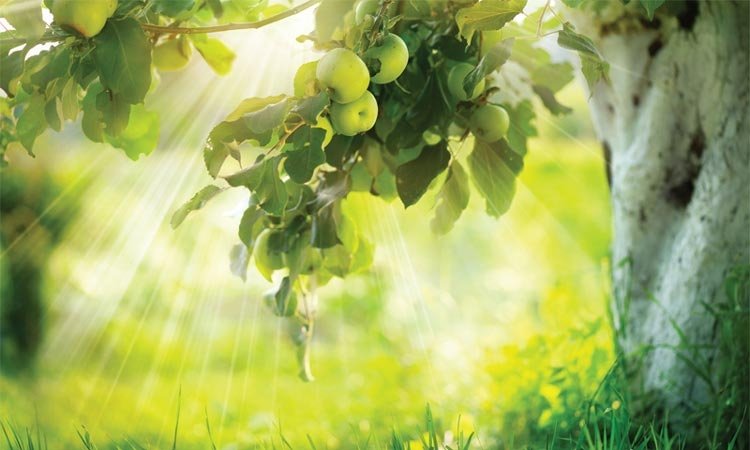I was recently fascinated to read how scientists learned how to make more effective waterproof products such as raincoats and airplane parts by studying the ridges on butterfly wings. It struck me that I also could learn something from nature, and I began researching fruit trees.
I found that each kind of fruit tree has its own requirements for soil, moisture, sunlight, and pollinator. It showed me that each project has to be studied on its own merits to find out what works in each situation. It behooves us to learn the lay of the land and study the situation in the area where we are embarking on our project. That’s why new companies pay big bucks to consultants who can help them determine what will work in the area they are expanding into.
It takes patience to get a harvest—two to five years from seedling to fruit—and it takes about the same amount of time to establish a new business. While the young fruit tree is growing, it needs protection from dangers such as harmful insect pests, climate extremes, drought, flooding, and too much or too little sunshine. The start of anything is the hardest. In the early stages of any endeavor, particular care and attention need to be given. But we can take heart, as things do get easier as the “tree” grows and gets established.
Now on to the sexy subject of pollination—plant reproduction. This is all about leaving a legacy for the next generation—lunch for the next bunch. Most farmers bring in bees to do the job of spreading the pollen, but there are other insects and birds that do the job as well. We, like the flower blossom, have to open to new opportunities. When the flower is just opening its bud, it has no assurance that it will ever be pollinated, but it is ready when the chance comes. In spring, the fruit tree puts forth its blossoms, inspiring picnics, poetry and song.
I found out there are two kinds of fruit trees—those that are self-pollinating (like apricots), and those that need an outside pollinator (like apples). But even among the self-pollinating kind, a sweeter and healthier fruit can often be obtained through pollination from another source. This could be applied in the sense of getting help from others to make our project more fruitful. Those who try to do everything themselves are soon worn out and frustrated from the effort. It takes a team to make most endeavors effective.
Fruit growers pay particular attention to this part of the growing process by planting compatible trees next to ones they want to pollinate. Many growers plant crabapple trees nearby as their pollen is accepted by most apple trees. The crabapple is itself too bitter to eat, but it renders the other trees in the neighborhood sweet. The application could be that good ideas and fruitful results often come from unexpected sources or people—sometimes the opposite from what you would expect. Be ready for surprises!
My elderly Japanese neighbor asked me and a few friends to help him with his apricot trees. They were budding and small fruits were appearing. “When you see three buds coming out of a branch,” he instructed, “pluck two and throw them away.” At the time, it seemed like a waste, but the result was one large fruit instead of three small ones. That concept stuck with me. You can diversify too much. There’s a lot to say for concentrating on your main goal.
To be really fruitful, we need to be like a tree planted by the rivers of water that brings forth his fruit in his season. 1 We need to get our spiritual nourishment from the source. If we were a mobile phone battery, it would mean plugging into the power supply to get recharged. If we were a grapevine, it would mean putting our roots down into the fertile earth. As people, we need to draw strength and spiritual sustenance from our source—our Creator. We do this through taking time reading and meditating on His Word and through prayer. We then begin to bear the fruits of the Spirit, which are love, joy, peace, longsuffering, kindness, goodness, faithfulness, gentleness, and self-control, 2 which make us truly effective in our endeavors.
